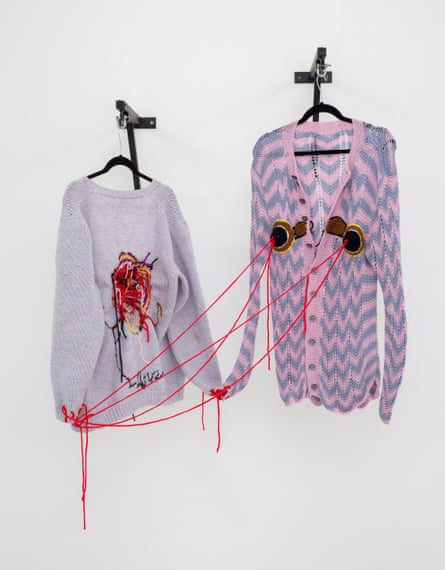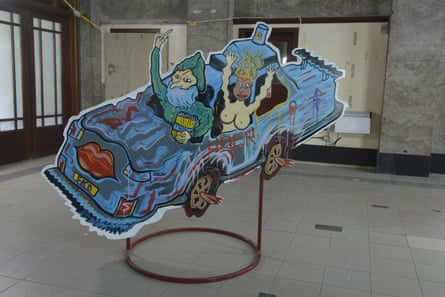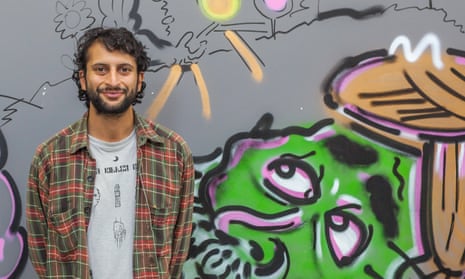You can learn a lot about Hardeep Pandhal from the title of his new solo exhibition, Paranoid Picnic: The Phantom BAME. There’s the ever-present wordplay, the tense yet humorous relationship to race and identity, and even a reference to the Glasgow-based artist’s taste in video games (Metal Gear Solid V: The Phantom Pain is known for having an absurdist streak amid its violence).
Pandhal describes the show as “straddling” two Nottingham art venues: Primary – a repurposed school building that suits Pandhal’s DIY approach – and the more typical, white-walled New Art Exchange. That term could also apply to his work, which straddles the complexities of identity as a British-Indian man. For Pandal, identity is rife with conflict, but also something he approaches with an acidic sense of humour, to poke holes in the tension.
His drawings and animations feature the recurring image of the sepoy – locally recruited soldiers in British-ruled colonial India – rendered as absurd caricatures in Pandhal’s psychedelic, half-melted hand-drawn style. On a new animation that gives the exhibition its title, Pandhal repeatedly raps the phrase “Paki visionary”, angrily appropriating the racial slur in a moment of self-aggrandisement. It’s the sort of ego we might expect to hear from any number of mainstream rappers, but one that’s also self-aware and critical. He knows that, as an artist of Indian heritage, he’s likely to be labelled in certain ways that white artists would not be, and that his work will be expected to hold the special “cultural signifi-cunts” he alludes to in his rap.
Rapping has increasingly become an outlet for Pandhal, whose loose flow hangs over his work, giving a window into his way of thinking. “It’s economical and it’s fun,” states the artist.
2018 was undoubtedly a big year for Pandhal. He was nominated for the Film London Jarman award, and included in high-profile international exhibitions such as the New Museum Triennial in New York. He was also one of the few locally based artists to make it into the main programme for Glasgow International. “It was flattering to be involved,” he says. “It’s good for facilitating, supporting and allowing various different approaches to exist, it’s something that isn’t really paralleled elsewhere.”

Pandhal is reflective when it comes to his home. “Living in Glasgow, architecturally, there’s this presence,” he states, referring to the Victorian buildings and monuments that are a common sight throughout the city, yet a constant reminder of the legacy of the British empire and colonialism. This has partly inspired in Pandhal a desire to connect more with India and its art scene; he has already made tentative steps via his presentation with Jhaveri Contemporary of Mumbai at London’s 2018 Frieze art fair.
Such a move also relates to a long-held desire to connect more with his mother. Pandhal grew up with English as his first language, while his mother speaks Punjabi, preventing them from being able to fully communicate with one another. Pandhal wants 2019 to be the year that he becomes fluent in Punjabi, and he also hopes to continue an artistic collaboration with his mother that has seen him altering and embroidering clothing that she makes, creating an exchange between parent and child that they aren’t able to express to each other through language.
Despite this barrier to communication, Pandhal says his parents have always remained supportive – if a little bemused – by his art career. “With bits of press and my presence online, they can get a sense that I’m involved in something and it’s making me happy,” he says, noting that some of his peers who had the potential to find success at art school were pushed away from it by their parents.
Despite their work together, Pandhal says his mother is not likely to be joining him as an artist any time soon. “She makes all of her clothes, so that’s quite normal for her,” he says. “To her it’s not art and it’s not a collaboration.”
Paranoid Picnic: The Phantom Bame is at New Art Exchange and Primary, Nottingham, 19 January-17 March.

